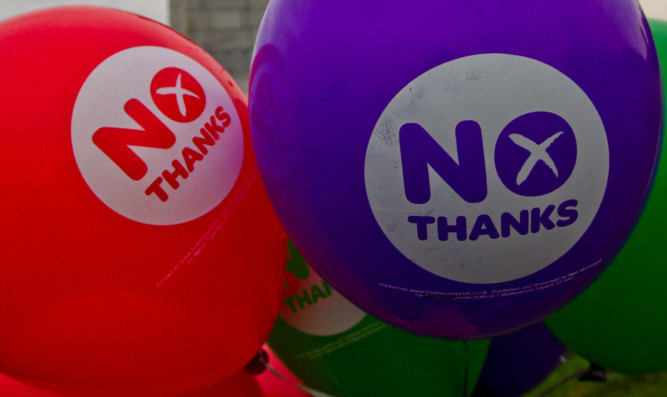Scots remain sceptical about independence nearly one year after it was rejected in a referendum, a poll has found.
A YouGov survey for The Times found 48% would vote Yes to independence if a poll was held tomorrow, against 52% who would vote No.
However, support for Yes is three points higher than the referendum result in 2014, and comes after a string of surveys by other polling companies that have shown a growing majority for Yes.
The SNP’s leadership has faced calls from some sections of the party to include a commitment to another referendum in its 2016 Holyrood manifesto, but the latest poll found 64% of Scots said a referendum should be a “once in a generation” event and 59% believe it should not be in the next SNP manifesto.
However, of the 64% who say the referendum should be “once in a generation”, 24% agree with the First Minister that “if the political situation changes then it may be right to have another referendum sooner”.
In an interview with The Herald, former first minister Alex Salmond said there are “at least four material circumstances bubbling away” that could trigger another poll.
Mr Salmond has already cited a refusal to deliver on “the vow” of more extensive powers for Holyrood, the threat of Scotland being pulled out of the European Union against its will and “austerity to the max”.
Asked if Trident renewal may be another trigger, Mr Salmond told The Herald: “There are four issues, any one of which and a combination of them most certainly could provide a change in material circumstances, which both identifies what Nicola (Sturgeon) has been talking about and would belie my (once in a generation) forecast of the timescale for a constitutional referendum.”
He added: “Lots of people are opposed to Trident. It’s in the SNP’s DNA.”
However, The Times poll found 53% of Scots support the retention of nuclear weapons, with 24% backing Trident’s replacement with an equally powerful weapon, 29% backing it with a cheaper less powerful weapon, and 37% saying the UK should give it up completely.
Scottish Labour is expected to hold an open vote on support for Trident at its conference next month, but just 21% of people who voted Labour at the last Holyrood election think it should back disarmament.
Ms Sturgeon has also cited a vote to leave the EU against the majority will of the people of Scotland as a material change that could trigger another referendum.
The YouGov poll found 15% of Scots who do not want a referendum in the next few years would change their mind if Britain voted to leave the EU.
In such a scenario, 50% would want a referendum, compared with 36% who would not.
The poll also found Scots overwhelming support the abolition of the House of Lords (67%), and they are split on the Scottish Government’s rejection of GM crops, with 35% in favour and 34% against.
* YouGov /The Times Survey questioned 1,110 Scotish adults between September 7-10.
